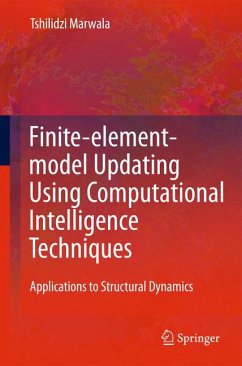Finite element models (FEMs) are widely used to understand the dynamic behaviour of various systems. FEM updating allows FEMs to be tuned better to reflect measured data and may be conducted using two different statistical frameworks: the maximum likelihood approach and Bayesian approaches. Finite Element Model Updating Using Computational Intelligence Techniques applies both strategies to the field of structural mechanics, an area vital for aerospace, civil and mechanical engineering. Vibration data is used for the updating process. Following an introduction a number of computational intelligence techniques to facilitate the updating process are proposed; they include:
. multi-layer perceptron neural networks for real-time FEM updating;
. particle swarm and genetic-algorithm-based optimization methods to accommodate the demands of global versus local optimization models;
. simulated annealing to put the methodologies into a sound statistical basis; and
. response surface methods and expectation maximization algorithms to demonstrate how FEM updating can be performed in a cost-effective manner; and to help manage computational complexity.
Based on these methods, the most appropriate updated FEM is selected using the Bayesian approach, a problem that traditional FEM updating has not addressed. This is found to incorporate engineering judgment into finite elements systematically through the formulations of prior distributions. Throughout the text, case studies, specifically designed to demonstrate the special principles are included. These serve to test the viability of the new approaches in FEM updating. Finite Element Model Updating Using Computational Intelligence Techniques analyses the state of the art in FEM updating critically and based on these findings, identifies new research directions, making it of interest to researchers in strucural dynamics and practising engineers using FEMs. Graduate students of mechanical, aerospace and civil engineering will also find the text instructive.
. multi-layer perceptron neural networks for real-time FEM updating;
. particle swarm and genetic-algorithm-based optimization methods to accommodate the demands of global versus local optimization models;
. simulated annealing to put the methodologies into a sound statistical basis; and
. response surface methods and expectation maximization algorithms to demonstrate how FEM updating can be performed in a cost-effective manner; and to help manage computational complexity.
Based on these methods, the most appropriate updated FEM is selected using the Bayesian approach, a problem that traditional FEM updating has not addressed. This is found to incorporate engineering judgment into finite elements systematically through the formulations of prior distributions. Throughout the text, case studies, specifically designed to demonstrate the special principles are included. These serve to test the viability of the new approaches in FEM updating. Finite Element Model Updating Using Computational Intelligence Techniques analyses the state of the art in FEM updating critically and based on these findings, identifies new research directions, making it of interest to researchers in strucural dynamics and practising engineers using FEMs. Graduate students of mechanical, aerospace and civil engineering will also find the text instructive.
Dieser Download kann aus rechtlichen Gründen nur mit Rechnungsadresse in A, B, BG, CY, CZ, D, DK, EW, E, FIN, F, GR, HR, H, IRL, I, LT, L, LR, M, NL, PL, P, R, S, SLO, SK ausgeliefert werden.
From the reviews:
"This book introduces the concepts of computational intelligence for finite-element-model updating. ... This book opens new research directions in the field of computational intelligence applied in mathematical models that use finite-element updating method. I would warmly recommend this book for the under-graduated and graduated students, researchers and all the people interested in the fields of computational intelligence and the finite element method." (Razvan Raducanu, Zentralblatt MATH, Vol. 1197, 2010)
"This book introduces the concepts of computational intelligence for finite-element-model updating. ... This book opens new research directions in the field of computational intelligence applied in mathematical models that use finite-element updating method. I would warmly recommend this book for the under-graduated and graduated students, researchers and all the people interested in the fields of computational intelligence and the finite element method." (Razvan Raducanu, Zentralblatt MATH, Vol. 1197, 2010)

